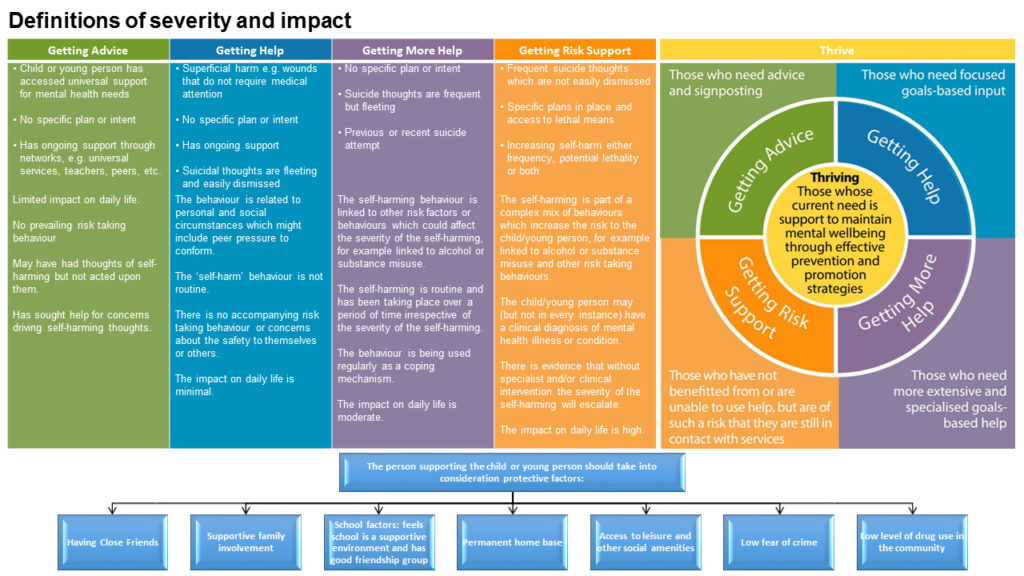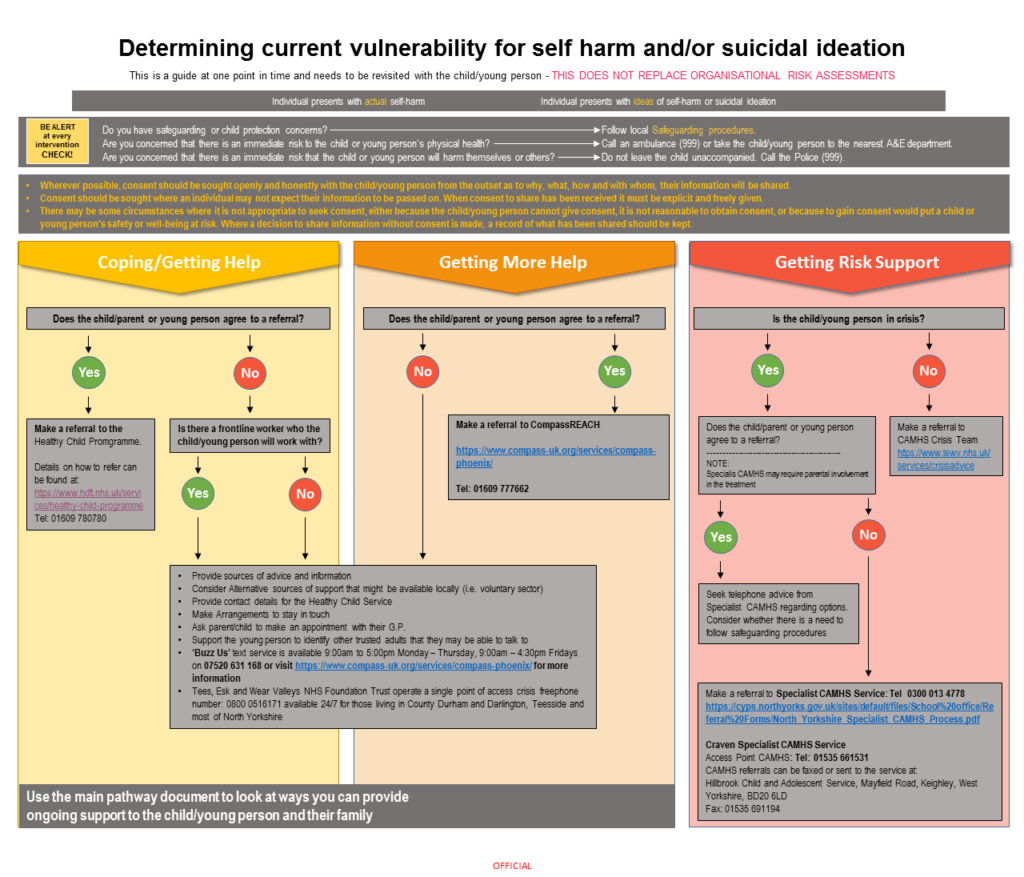North Yorkshire Pathway of support for children and young people with self-harming behaviour or suicidal ideation
Who is the pathway for?
The purpose of the pathway is to improve the referral processes, and the coordination of information, advice, support and treatment that is provided to children and young people who self-harm and/or experience suicidal ideation. If this is achieved the benefits experienced by children, young people and their families will be evidenced by them reporting a high level of satisfaction with:
- The speed in obtaining a response to their concerns.
- The appropriateness of the information, advice, support or treatment that is provided.
- The positive changes to the child/ young person’s self-harming behaviour and emotional wellbeing.
- Improvements will be evidenced by:
- A decrease in the number of reported incidents of self-harm
- A decrease in the seriousness of the self-harm that is reported.
- A decrease in the numbers of presentations as a result of self-harm at Accident and Emergency departments.
- A decrease in the number of repeat referrals.
- A reduction in the numbers of requests for home tuition or alternative educational provision as a result of mental health problems.
- A decrease in the number of deaths as a result of self-inflicted injuries.
This pathway is primarily for frontline staff working with children and young people who identify themselves as self-harming or are at risk of self-harm.
Further guidance and support regarding self-harm and suicidal ideation for parents and carers is also available as follows:
For children and young people: https://www.safeguardingchildren.co.uk/children-young-people/mental-health-2/
For parents and carers: https://www.safeguardingchildren.co.uk/parents-carers/parents-and-carers-self-harm-and-suicide-ideation/
This information has been produced by North Yorkshire Safeguarding Children Partnership (NYSCP) – North Yorkshire Social Emotional Mental Health (NY SEMH) steering group and the Suicide Prevention Subgroup (SPSG).
Why have a pathway?
The purpose of the pathway is to improve the referral processes, and the co-ordination of information, advice, support and treatment that is provided to children and young people who self-harm and/or experience suicidal ideation.
Where this is achieved the benefits experienced by children, young people and their families will be evidenced by them reporting a high level of satisfaction with:
- The speed in obtaining a response to their concerns
- The appropriateness of the information, advice, support or treatment that is provided
- The positive changes to the child/ young person’s self-harming behaviour and emotional wellbeing
Improvements will be evidenced by:
- A decrease in the number of reported incidents of self-harm
- A decrease in the seriousness of the self-harm that is reported
- A decrease in the numbers of presentations as a result of self-harm at Accident and Emergency departments
- A decrease in the number of repeat referrals
- A reduction in the numbers of requests for home tuition or alternative educational provision as a result of mental health problems
- A decrease in the number of deaths as a result of self-inflicted injuries
What does self-harm mean?
This pathway will use the definition as defined by the National Institute of Clinical Excellence (NICE) as self-harm being:
“…self-poisoning or self-injury, irrespective of the apparent purpose of the act”
https://www.nice.org.uk/guidance/qs34/chapter/Introduction-and-overview
What does suicidal ideation mean?
Suicidal ideation, also known as suicidal thoughts, is thinking about or having an unusual preoccupation with suicide. The range of suicidal ideation varies greatly from fleeting thoughts, to extensive thoughts, to detailed planning, role playing, and incomplete attempts, which may be deliberately constructed to not complete or to be discovered, or may be fully intended to result in death, but the individual survives.
What does crisis mean?
A crisis is:
“…a perception or experience of an event or situation as an intolerable difficulty that exceeds the person’s current resources and coping mechanisms.”
(James and Gilliland, 2001)
When in crisis a person may need urgent help and support from others restore their own coping problems solving abilities or skills.
How to assist children in crisis
- Be a good listener
- Assist with practical needs such safety, care
- Encourage child and family to seek professional help.
Severity and the risk and/or impact of self-harming
The severity and impact of the self- harming behaviour on the safety and emotional wellbeing of the child/young person should inform decisions about the support or treatment that is provided.
This document should form a guide for practitioners but should always be used alongside any previous knowledge and information available to inform the decision process.
The pathway makes clear where children and young people and/or families and practitioners can access advice and support as concerns about the severity and/or impact associated with self-harming increases.
This guidance is not intended for use in circumstances where there is an immediate threat to life or risk of significant physical harm.
If you have serious and immediate concerns regarding the safety of a child or young person due to self-harm, suicidal ideation or other significant risk issue then contact the emergency services by dialling 999.

www.implementingthrive.org/wp-content/uploads/2016/03/Thrive.pdf

If you are worried about a child?
Anyone can make a referral if you are worried about any child and think they may be a victim of neglect or abuse, whether as a member of the public or as a professional.
Please use the North Yorkshire Self-harm and Suicidal Ideation Pathway to identify the appropriate support available.
Professionals in all agencies have a responsibility to refer a child to Children’s Social Care when it is believed or suspected that a child has suffered significant harm and /or;
- Is likely to suffer significant harm and/or;
- Has developmental and welfare needs which are likely only to be met through provision of family support services (with agreement of the child’s parent).
If you are worried about a child or a young person under the age of 18 you should contact the children and young people’s service through the Customer Service Centre. If your concern is outside of normal office hours, you should contact the emergency duty team.
During Office Hours
By Phone: 0300 131 2 131
Email: social.care@northyorks.gov.uk
Outside Office Hours
Emergency Duty Team (for evenings, weekends and bank holidays): 0300 131 2 131
Further details can be found at the following address:
www.northyorks.gov.uk/social-care-out-hourssupport or
www.safeguardingchildren.co.uk/about-us/worried-about-a-child
Making a referral
Before making a referral to the North Yorkshire Children and Young People’s Service you should contact the Customer Service Centre on the number above. A written confirmation of the referral must be completed and submitted within 24 hours. Where possible, the North Yorkshire Children and Young People’s Service request that you use their “Universal Referral Form” to ensure that all relevant information is provided to ensure that the referral can be progressed as effectively as possible the North Yorkshire Safeguarding Children Partnership’s website contains a broad range of information, signposting and referral guidance in relation to children who may be vulnerable or at risk.
www.safeguardingchildren.co.uk








 View all our news
View all our news